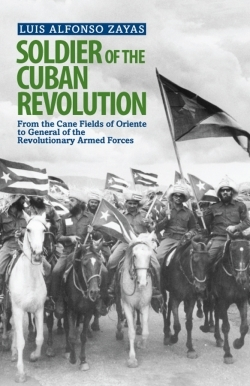Soldier of the Cuban Revolution
From the Cane Fields of Oriente to General of the Revolutionary Armed Forces
It is said that history is written by the winners. Soldier of the Cuban Revolution: From the Cane Fields of Oriente to General of the Revolutionary Armed Forces, by Luis Alfonso Zayas, presents events of the Cuban revolution through the eyes of a man who was there, playing an intimate role in these momentous events.
Luis Alfonso Zayas grew up in rural Cuba during the years before the revolution of the late 1950’s. His father was a colono, a farmer growing sugar cane on land he owned in Oriente province. Zayas describes in detail and with passion the hardships endured by farmers and farm laborers alike in a system dominated by the sugar mill owners, primarily US-based corporations, and enforced by the Guardia Rural. He explains the quota system that capped the amount of sugar cane that could be cut each year, effectively keeping the colono forever in debt to the mill owner. Zayas recounts life in pre-revolution rural Cuba as harsh and precarious, without adequate roads or communication systems, little health care, and very little education for the peasants. It was truly fertile ground for revolution.
The author explains how he joined the fledgling revolutionary movement, and relates how he fought with Castro’s militia beginning in the mountains through their victory in 1959. Along the way, Zayas rose in rank from an untrained foot soldier to a Commander in the Revolutionary Armed Forces who later went to Angola along with nearly 375,000 other Cubans to fight against the invasion of South Africa’s apartheid government. Throughout his military career, until he retired as a Brigadier General in the Revolutionary Armed Forces in 1998, he also held positions central to the country’s Agriculture Ministry and to the Cuban Communist Party in one of the most underdeveloped parts of Cuba.
The book is the result of a series of interviews of Zayas conducted by Mary-Alice Waters and others, primarily in 2007 and 2009 in Havana. In the interview format, Zayas responds to questions advanced by Waters and the answers are sometimes rambling and filled with detail, such as lists of names of people and places which are likely more significant to those who know a great deal more about the locale and its history than the average reader. Fortunately, a glossary of individuals, organizations, and events is included. The book is well illustrated with black-and-white photos.
Soldier of the Cuban Revolution is one of a series of several books published by Pathfinder Press about the Cuban Revolution. In her introduction, Waters asserts the workers and farmers of Cuba accomplished the impossible: “They broke the armed might, and then the economic power, of the existing ruling class and set out to create a just world order.” Whether they have fully accomplished their task is for future historians to decide; but, for now, the revolutionaries like Zayas are the winners and as such they have won the right to tell their story.
Reviewed by
John Michael Senger
Disclosure: This article is not an endorsement, but a review. The publisher of this book provided free copies of the book and paid a small fee to have their book reviewed by a professional reviewer. Foreword Reviews and Clarion Reviews make no guarantee that the publisher will receive a positive review. Foreword Magazine, Inc. is disclosing this in accordance with the Federal Trade Commission’s 16 CFR, Part 255.

